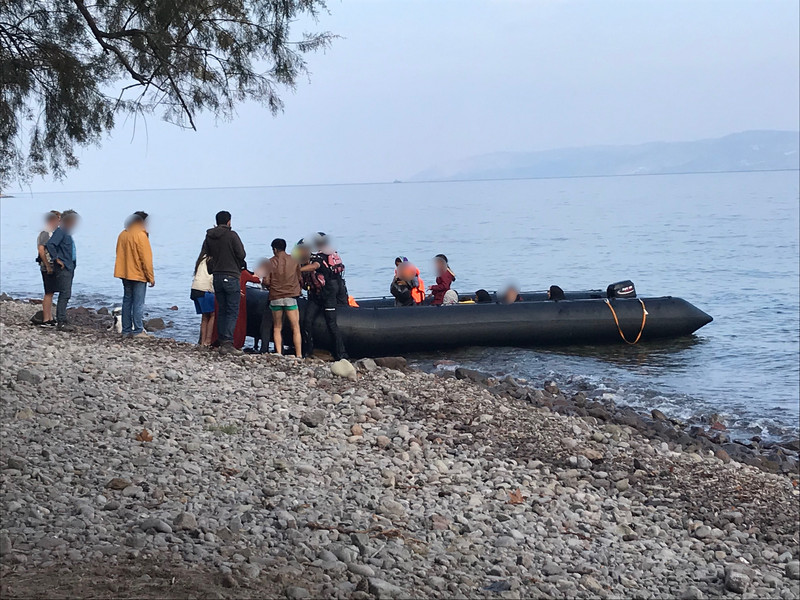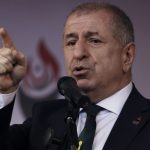Ebrahim Azard is a 26-year old asylum seeker from Gaza.
On Monday (27 June), he told EUobserver that he had been beaten by Greek commandos at the Evros land border with Turkey in April of last year.
-

Ebrahim Azard says the wounds on his back on a result of beatings by the Greek authorities (Photo: Ebrahim Azard)
“They stripped us, took us to a remote building two by two so that nobody could hear us scream,” he said.
Azard said the commandos were with masked men who spoke Arabic and knew the routes taken by migrants.
He said they were then forced back to Turkey in a move described as a pushback, which is illegal under EU and international law.
Azard tried again a second time, this time on a boat from Bodrum, a coastal city in Turkey, to the Greek island of Kos. A friend of his was drenched in fuel during the crossing and fell ill.
When they landed on Kos, they were beaten and almost all were put on a small boat and dragged out to Turkish waters.
His friend, Mohamed Nasser, who had fuel burns, later died in a hospital, he said. Azard made a third attempt and finally arrived, this time on the island of Rhodes.
EUobserver could not independently verify Azard’s testimony, but images of the alleged beatings showed bruising on his back and his arm.
The testimony also runs consistent with numerous other cases of pushbacks reported in Greece.
The UN refugee agency (UNHCR) has recorded almost 540 reported incidents of “informal returns by Greece since the beginning of 2020.”
Thirteen are now being investigated by the Greek authorities, including a case where a Frontex interpreter was himself pushed back into Turkey from Greece in September of last year.
The Frontex interpreter, who is a legal resident of the European Union, had also been assaulted, reported the New York Times.
The Greek Ombudsman, a watchdog, is probing over 50 push back incidents involving some 10,000 people.
And the EU human rights court in Strasbourg has issued injunctions or so-called interim measures on 13 different pushback cases, some involving children.
No problems
But Notis Mitarachi, the Greek minister of migration and asylum, has long denied any wrongdoing amid claims that the reported incidents are part of a Turkish propaganda machine.
It was a position he maintained once again on Monday when he told European lawmakers in the civil liberties committee that Greece fully respects fundamental rights and the right to life.
When pressed on the case of the Frontex interpreter, Mitarachi described it “as very peculiar.”
“It is being investigated by independent authorities,” he said.
“I would expect a response on this case, hopefully extremely soon,” he added.
He said Greece had rescued 5,000 people this year, including almost 200 in the past month.
He said the term pushbacks can mean different things and cited EU regulation 656/2014 that allows for interceptions at sea.
But not everyone is convinced.
Last year, Nora Markard, a law professor at the University of Münster in Germany, said people intercepted at sea must first still have their asylum claims heard.
Mitarachi then cited European Court of Human Rights jurisprudence, noting that summary collective expulsions are allowed under certain circumstances.
He referenced a Strasbourg case involving Spain and its northern enclaves in Morocco.
But a legal note by the European Commission said this doesn’t mean it can be applied in all situations and in all cases.
“Our border protection policy is in no way preventing access to the asylum procedure,” he said.
Turkey, he said, was also failing to implement a 2016 agreement with the EU to take back migrants landing on Greek shores.
He said over 200,000 people have arrived from Turkey since the agreement and that Greece had offered international protection to over 80,000 people since 2019.
But Greek left MEP Konstantinos Arvanitis, present at the hearing, later described Mitarachi’s statements as lies.
“As always, the real questions went unanswered, the real issues unaddressed,” he said.
By NIKOLAJ NIELSEN
Source: EU Observer



